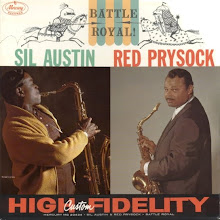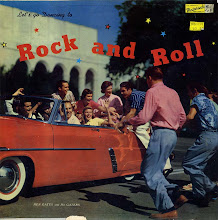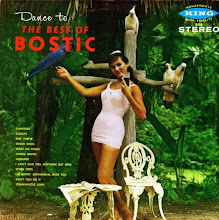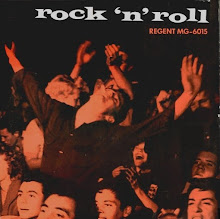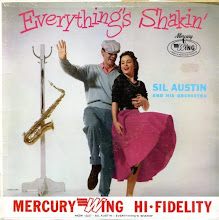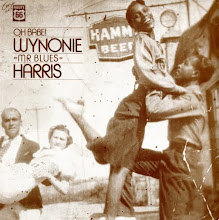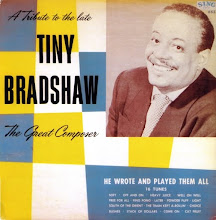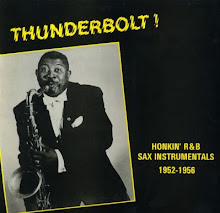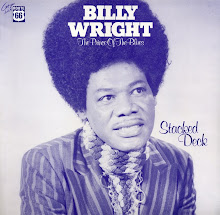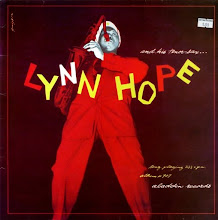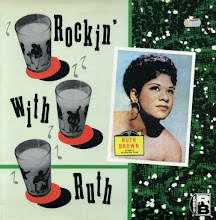Side One:
01. Keep A Knockin' *
02. Be Good Or Be Gone * (?)
03. I Tried
04. It's Too Late Baby
05. Let's Jump Tonight
06. Change My Mind
07. Loud Mouth Lucy
08. Wrong Lake To Catch A Fish
Side Two:
01. Lawdy Miss Mary
02. Baby's On My Mind *
03. You Know You Don't Love Me *
04. Search My Heart
05. I Can Tell
06. I Need One More Chance
07. I Don't Mind If I Do *
08. Break My Rule *
* = previously unreleased
Last post of 2017 and it's a revival of a collection of Chuck Willis OKeh sides which was originally posted in October 2008.
As is usual with these "revival" posts I've added new cover and label scans, plus I've also boosted the volume slightly. Included in the download is a selection of original 45 label scans sent in by Joan K.
I was never a big fan of Chuck Willis and as I stated back in the original post this LP remained unplayed and lost on my shelves for many years, and I must confess that since that post I've scarcely listened to the tracks again. However, I've been listening to it repeatedly over the last week or so in the build up to this post, and once more I've realized that this really is a cracking collection of prime R&B.
The sleevenotes by Clive Anderson are excellent, giving insight into the background behind these tracks recorded for OKeh between 1951 and 1956. They are also highly evocative of the music milieu of Atlanta, Chuck's home town, and the place where he started out on his music career. It was thanks to local DJ Zenas "Daddy" Sears that he was spotted and steered towards Columbia records man Danny Kessler.
Chuck Willis was not only a talented singer, he was also a gifted songwriter and most of his records both for OKeh and later Atlantic were self penned. His first session for Columbia took place in January 1951 with his first release (" It Ain't Right To Treat Me Wrong" / "Can't You See") coming out in May 1951 on Columbia 30238. In the meantime Columbia had decided to revive the old OKeh label as its outlet for R&B recordings under the management of Kessler and Chuck's releases were thereafter issued on the subsidiary label.
OKeh started issuing records in July 1951 but the first scheduled record by Chuck ("Let's Jump Tonight" / "Be Good Or Be Gone") which was due to be the sixth issue on the label, seems to have been cancelled and his first OKeh disc was "I Tried" / "I Rule My Home" which was issued in August 1951. His five year spell at OKeh was reasonably successful with five R&B chart entries being achieved: "My Story," "Going To The River" (a cover of a Fats Domino hit), "Don't Deceive Me," "You're Still My Baby" and "I Feel So Bad."
None of these hits are on this collection which nevertheless is an enjoyable listening experience. But thanks to Joan K let's take a brief look at some smash hit R&B labels:
When Chuck Willis signed up with Atlantic in early 1956, his career moved up a gear, for his records not only featured on the R&B charts, they also started to appear in the pop charts. His version of the old blues "C. C. Rider" reached number 12 in the Billboard pop chart in May 1957 and "Betty And Dupree" reached number thirty three in April 1958. Both of these songs were suited to a new dance craze called The Stroll and Chuck became known as The King Of The Stroll. His biggest pop hit came in May of 1958 - "What Am I Living For" and "Hang Up My Rock And Roll Shoes," a pairing which proved to be ominously titled for by the time they were entering the charts Chuck was deceased, having died in hospital on April 10th during an operation on stomach ulcers.
Recording and Release Details
"Be Good Or Be Gone" and "Let's Jump Tonight" were recorded on January 26th 1951. Both sides were scheduled to be released on OKeh 6805, i.e. the sixth release on the label. Apparently this record remained unreleased. "Let's Jump Tonight" b/w "It's Too Late Baby" was released as OKeh 6841 in December 1951.
"I Tried," "It's Too Late Baby" and "Baby's On My Mind" were recorded on 27th June 1951. "I Tried" b/w "I Rule My House" was released on OKeh 6810 in August 1951. "It's Too Late Baby" was B side of "Let's Jump Tonight" OKeh 6841, December 1951. "Baby's On My Mind" was not released on single.
"Loud Mouth Lucy" was recorded on February 27th 1952. Released on OKeh 6873 (b/w "Here I Come") in May 1952.
"Wrong Lake To Catch a Fish" was recorded on 26th June 1952. Released on OKeh 6930 as B-side of "Salty Tears" in December 1952.
"You Don't Love Me (You Broke My Heart)" was recorded on 19th November 1952. Unreleased.
"Keep A Knockin'" and "Need One More Chance" were recorded on February 5th 1954. "Need One More Chance" was released on OKeh 7029 (B-Side of "I Feel So Bad") in May 1954. "Keep a Knockin'" was not released.
"Change My Mind" and "I Don't Mind If I Do" were recorded on June 24th 1954. "Change My Mind" b/w "My Heart's Been Broke Again" was released on OKeh 7041 in August 1954. "I Don't Mind If I Do" was not released.
"Lawdy Miss Mary" was recorded on December 17th 1954. Released on OKeh 7051 (b/w "Love-Struck") in February 1955.
"Search My Heart" and "I Can Tell" were recorded on April 15th 1955. "I Can Tell" was released on OKeh 7055 (b/w "One More Break") in May 1955. "Search My Heart" was released on OKeh 7062 (b/w "Ring-Ding-Doo") in October 1955.
"Break My Rule" was recorded on January 26th 1956 but not released as a single.
Elsewhere on the blog:
Following the original posting of "Be Good Or Be Gone" in October 2008, an anonymous donor contributed an Atlantic LP "I Remember Chuck Willis" (Atlantic 8079).
Side One:
01. What Am I Living For
02. Hang Up My Rock & Roll Shoes
03. Stop And Think
04. From The Bottom Of My Heart
05. Just One Kiss
06. You'll Be My Love
07. Keep A Drivin'
Side Two:
01. C. C. Rider
02. Betty & Dupree
03. I'll Be So Glad When Your Heart Is Mine
04. Big Drops Of Rain
05. Sugar Sugar
06. Love Of Loves
07. My Baby
Recommended purchase:
There are a number of Chuck Willis compilations available and they are easy to find on well known sellers' websites. A few years ago I bought the JSP 3CD set "The Complete Chuck Willis 1951 - 1957." I hardly listened to it until I started preparing this blog post and I must say that I found it tons o' fun.
There is no doubt that Chuck Willis was a major talent. He was probably at his best performing what I like to call "Big Beat Ballads" - which mixed pop and blues influences. Some of his OKeh sides have tremendous blues feeling, especially where guitarist Roy Gaines is given prominence. You can buy this set with confidence. By the way, the title is slightly misleading as the set includes his 1958 Atlantic sides. I think every OKeh and every Atlantic side is included.










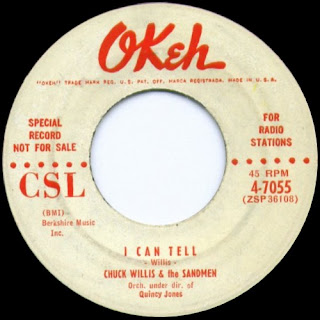








































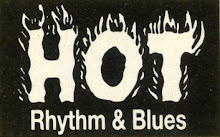
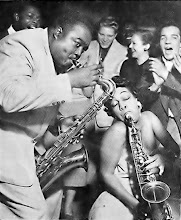





%2045%20-%20435A.png)
.jpg)
















